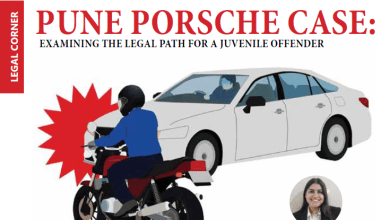YOUR RIGHTS UNDER THE LAWS OF INDIA
Let’s enlighten you with a few Laws and Rights that one possesses being an Indian citizen. There are numerous laws and rights, which are made to protect the people, but unfortunately, most people are never aware of these. Thus, here are some laws and rights you should be aware of, this will not only protect the interest of people but will also ease their lives.
-By Adv. Surabhi Sankhla
1. LIVE-IN RELATIONSHIP ARE LEGAL
Live-in relationships in India are not illegal. The Hon’ble Supreme Court of India held in the case in 2010 gave legal recognition to living relationships. The court held that a live-in relationship comes under the ambit of the Right to Life enshrined under Article 21 of the Constitution of India. The two adults (18 years and more), living together, in any case, cannot be considered illegal or unlawful.
In case of Indra Sharma vs V.K. Sharma (2013) 15 SCC 755, the Supreme Court observed that a live-in or marriage-like relationship is neither a crime nor a sin though socially unacceptable in this country.
Domestic cohabitation between two unmarried couples in India is completely legal and lawful.
So readers let’s know that Live-in relationships aren’t illegal and no one has the right to harass or threaten any partners living together.

2. A CHILD BORN FROM A LIVING RELATIONSHIP IS NOT ILLEGITIMATE
The Child born out of a living relationship/ unmarried couple living under one roof shall not be treated as illegitimate. In the case of SPS Balasubramanyam v. Suruttayan, if the couple cohabited for a considerably long time, wherein the society recognizes them to see as husband and wife, the child born out of such relationship shall not be treated as an illegitimate child.
3. INTERROGATION BY POLICE
Interrogation in a layman’s language means questioning an accused with the purpose to obtain information about the crime. Interrogation is a part of the investigation, performed by the Police or any legal authority.
The provision/ exceptions provided under Section 160 of the Criminal Procedure Code (CRPC) law provides that the following persons cannot be called to the Police station for the interrogation:
1. Children below the age of 15
2. Any person above the age of 65 years
3. Any women
4. Any person who is mentally and physically disabled.
They can only be questioned in their residence in the presence of their family members.
Additionally, women arrestees have to be interrogated in the presence of women police officers.
4. ARREST BY POLICE
Arrest means the taking or keeping of a person in custody by police in response to a criminal charge.
As per the provision of Arrest according to Section 46 of the Criminal Procedure Code (CRPC), the law provides that nothing in this section gives a right to the Police officer to
(i) cause the death of the person who is being accused of an offence which is punishable with death or life imprisonment.
(ii) Also, no women shall be arrested after the sunset or before the sunrise and where there exist any exceptional circumstances, the women police officer has to make a written report and obtain prior permission from the Judicial Magistrate of First Class to have the local jurisdiction wherein the offence have been committed.
5. CERTAIN LAWS IN ASPECT OF THE TRAFFIC POLICE WE ALL MUST KNOW
(i) In India, no traffic police officer has the right to forcefully confiscate or snatch the vehicle keys of any person.
(ii) Do you know that now there is no need to carry the physical copy of the Driving Licence (DL) and the registration certificates (RC) while driving across the country, including Delhi NCR. Drivers can now keep the copy of their DL and RC in DigiLocker and m-parivahan App for showing to the Trac Police and Transport Department.
(iii) Remember, unless you are a minor (person under the age of 18), no police officer can force or threaten you to call your parents or any member of your family for doing a suspicious activity or merely to threaten you.
5. LAW LPG GAS CYLINDERS AND BLAST OF LPG GAS CYLINDERS
Very few people are aware of the fact that the responsibility for the gas cylinder explosion lies with the gas agencies. It is the sheer responsibility of the considered gas agency. It must be known that if an LPG cylinder explodes or any gas leakage is tantamount to an accident, the customers who suffered injury/loss have the right to claim compensation up to Rs.50 lakhs.
The National Consumer Forum had said in its decision that under the Marketing Displays Guidelines 2014 for LPG distribution, it is decided that if the dealer supplies the defective cylinder, it cannot put its responsibility on the complaint. Guidelines say that the dealer should check whether the cylinder is exactly right before delivery.
Compensation liability for loss due to an LPG cylinder accident is Rs 50 lakh per-incident and Rs 10 lakh per person. This compensation is payable in these cases.
6. Do you know the “GOOD SAMARITAN LAW OF INDIA”
Hello Readers, for ready reference Samaritan, is known as a charitable or helpful person. Any person who without the expectation of money or reward, in good faith voluntarily comes up for assistance and help of a person in need is a good samaritan.
In 2016, the Hon’ble Supreme Court of India gave “Force of Law” to the guidelines for the protection of good Samaritans in India issued by the Ministry of Road Transport and Highways. The purpose of the Good Samaritan law is to protect the bystanders who come to the aid and rescue the road crash victims. As we all are aware that India is an unfortunate victim of road accidents and in circumstances like this Samaritans acts like an angel. However, three out of four people in the country hesitate and are afraid to help the road victim. To discontinue such discomfort and hesitation certain guidelines were issued in favour of the good Samaritans, which protects them from any undue harassment and questionnaire after helping the victim.
So, from now onwards please don’t be afraid to help any road victim and have the privilege to be called a Good Samaritan.







